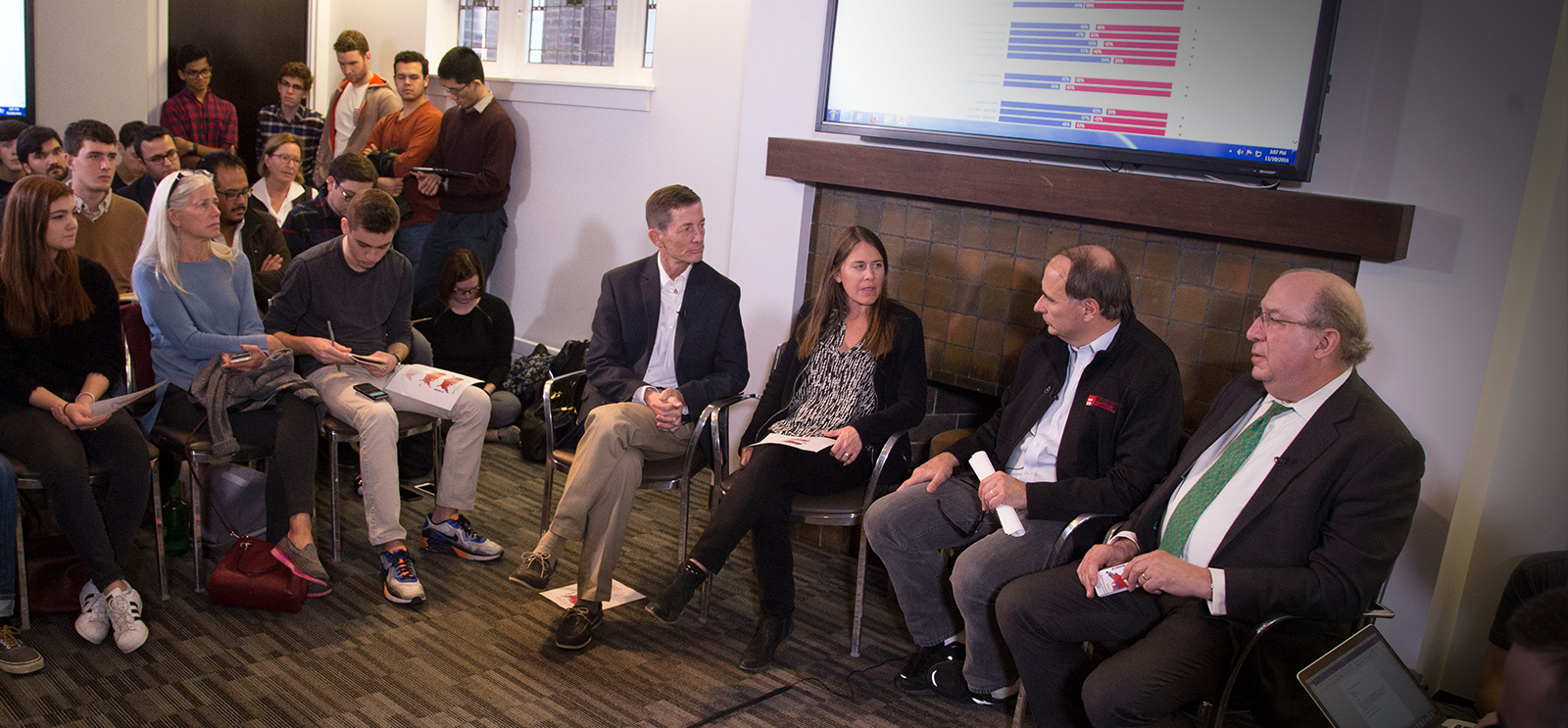
The IOP panel discussed issues including trade, climate change, and race. (University of Chicago Institute of Politics)
Following the presidential race, UChicagoans discussed what to expect after the unexpected.
Two days after November’s presidential election, the mood at the University of Chicago Institute of Politics was reflective. During a panel discussion in the IOP House’s intimate living room, David Axelrod, AB’76, spoke with several institute fellows about the results and what to expect from a Donald Trump presidency.
“Something big happened on Tuesday,” said Axelrod, who directs the nonpartisan institute and served as a senior adviser to president Barack Obama. And the outcome was, “by almost everyone, unanticipated.”
The event was one of many ways the UChicago community reacted to the 2016 election. On election night, the Chicago Maroon reported, some students took to the quad to celebrate Trump’s victory; a week later, the quad was the site of an anti-Trump rally.
Faculty members from across campus also grappled with the outcome. In the New York Times, William Howell, Sydney Stein Professor in American Politics at Chicago Harris, considered how much Republicans will accomplish with control of the White House and Congress. “There is a fair bit of historical evidence that Congress enacts more laws during periods of unified government,” he said. “But in this period of slim majorities and rampant obstructionism, past trends may not hold.”
Also in the Times, Luigi Zingales, the Robert C. McCormack Distinguished Service Professor of Entrepreneurship and Finance at Chicago Booth, compared Trump to former Italian prime minister Silvio Berlusconi and gave his advice to the opposition: “Democrats should also offer Mr. Trump help against the Republican establishment, an offer that would reveal whether his populism is empty language or a real position,” Zingales wrote.
Geoffrey R. Stone, JD’71, the Edward H. Levi Distinguished Service Professor of Law, was less conciliatory, describing Trump’s election as “a grievous mistake” in the Huffington Post. That view is shared by Harold Pollack, Helen Ross Professor at the School of Social Service Administration. Pollack suggested in the Nation that civil disobedience may become necessary to resist Trump. Pollack has also expressed concern about the future of health care, writing in the New York Times that Trump and congressional Republicans “owe Americans a detailed explanation of how they plan to replace” the Affordable Care Act.
At the IOP, the election-week panel included fellows Liesl Hickey, a Republican strategist; Bruce Reed, former Democratic White House adviser; journalist Philip Revzin; and former fellow Stuart Stevens, another Republican strategist.
Reed, who advised Presidents Clinton and Obama, attributed Trump’s victory to “an enormous amount of real pain” in the industrial Midwest and rural communities, while Stevens argued Trump’s victory was due less to economic anxiety than to Trump’s popularity among white voters of all incomes. Trump’s pledge to “make America great again” was racially divisive, said Stevens, a veteran of Mitt Romney’s 2012 campaign. “I don’t think a lot of African Americans are longing for the past.”
Looking ahead, the panel predicted a dim future for the Affordable Care Act, though they acknowledged the risks of repealing the law. “It’s a lot more fun to attack Obamacare than it is to own the successor to it,” Reed said.
Hickey anticipated debates over trade policy within the GOP. While Trump wants to pull out of or renegotiate trade deals, many congressional Republicans don’t. “For the most part they are a free trade conference.”
Abroad, news of Trump’s election has been greeted with trepidation, said Revzin, former publisher of the Wall Street Journal in Europe and Asia. Eastern Europeans, he said, are alarmed by Trump’s admiration for Russian Federation president Vladimir Putin, and in France, some believe Trump’s victory may energize far-right presidential candidate Marine Le Pen.
The Republicans and Democrats on the panel alike predicted soul searching within their parties. Trump, Stevens said, violated norms of civil discourse “and he got away with it. ... He was allowed to both run as an establishment Republican and something else by the end. I don’t think that speaks well about the [Republican] Party, frankly, or the whole process.”
Democrats are also in a moment of uncertainty. Reed predicted a more prominent role for progressives like senators Elizabeth Warren and Bernie Sanders, AB’64, but conceded that with just 16 governorships, the party will struggle to find an anti-Washington candidate to run in 2020.
Wrapping things up, Axelrod underscored the value of political participation. “Elections matter,” he said.
